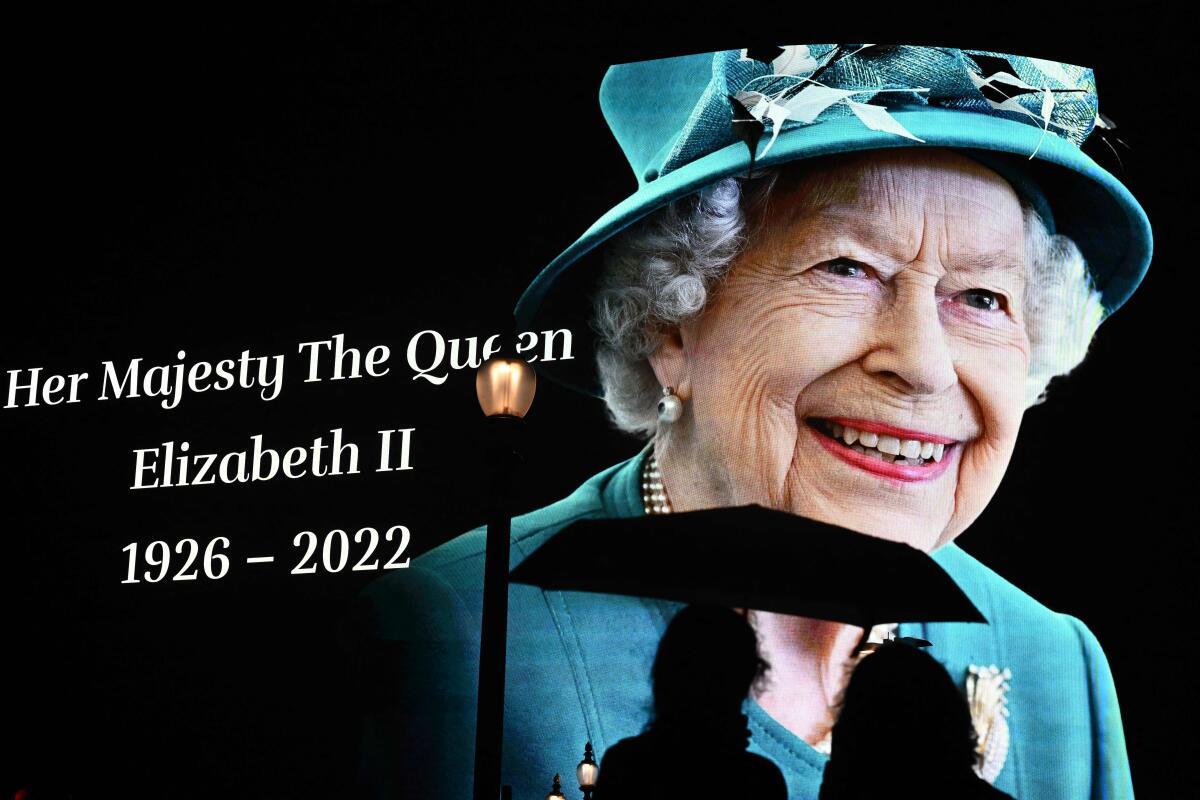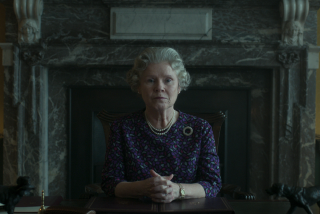Op-Ed: Letting go of Queen Elizabeth’s imperial Britain opens up new possibilities

- Share via
LONDON — In the United Kingdom, for the last 70 years, we have been habituated to one royal figurehead, Queen Elizabeth II. Her long rule spanned the bleak austerity of the 1950s and a decrepit empire lurching toward its destruction to a post-pandemic Britain grasping for some direction and cohesion.
It is amazing how much shock the death of a 96-year-old woman can prompt, as we begin days of national mourning and the feeling that the inevitable has overtaken us is strong. The country she has left behind is fractured, fragile and on the threshold of another deep winter of discontent.
What does it mean to embody a state, a church and a family all in one body? From the moment she was anointed with holy oil by the Archbishop of Canterbury at her coronation in 1953, she was described as living a life of service, one that forced the real Elizabeth Windsor to disappear from view. A huge part of her ongoing popularity within Britain was her ability to represent different things to different people.
She was the monarch who ruled over the dismantling of the British Empire and encouraged a more equal relationship among the 56 Commonwealth states that emerged from it. Simultaneously, however, she was the embodiment of a rapacious Britain that committed atrocities in many places, including Kenya, Ireland and India, and had the jewels of that exploitation to symbolize her collusion.
As the years have gone by, the queen’s image and reputation have been fiercely fought over, and the question of whether there should even be a royal family has never gone away. But with longevity she became a reassuring presence, beyond the ugly fray of domestic politics, and was able to reach out to ordinary people, such as the survivors of the Grenfell Tower fire in 2017, the site of which she visited with Prince William.
The royal family is a religion in Britain — arcane, irrational and with passionate believers as well as detractors, it is difficult to unpick or openly express how much it penetrates into even the most agnostic souls. From gossip and jokes to national mourning, the monarchy is ever-present.
A number of events over the last year have further entrenched the royal family’s presence in the national psyche. There was the death of Prince Philip; the outrage surrounding reports of the queen’s payment of Prince Andrew’s settlement to Virginia Giuffre in a sexual assault case; the queen’s Platinum Jubilee and now her death.
We cannot ignore this family or pretend that Britain isn’t frail or elderly itself. Our museums are stuffed with the bones of the dispossessed and their sacred things and artworks. In 2019, Queen Elizabeth reportedly refused to disinter the remains of Prince Alemayehu, the teenage son of Ethiopian Emperor Tewodros II, from the grounds of Windsor Castle and have his bones repatriated to Ethiopia. According to the Daily Mail, the queen was sympathetic but there were “concerns” that disturbing the catacombs in which he is buried would disturb the “sacred space” of the more than 40 people interred there.
It is likely that Elizabeth herself will be buried at Windsor Castle and conversations about history and justice will carry on without her. Despite many changes in what the monarchy meant or could represent, something that has not happened or maybe could not happen under the queen’s reign is a genuine accounting of what the British Empire meant and its continuing impact on Britain’s relations with the rest of the world.
The queen’s death is the end of an era, one that was full of traditions steeped in a feudal and imperial Britain, and I’m not sorry to see that go. But I also acknowledge how the queen navigated through those seven decades, making something alive and evolving from a moribund institution that could easily have been left behind.
This period of national mourning seemed to come with bad timing — amid high inflation, energy prices spiraling out of control and a new, untested government — but maybe this is what we need as we lurch from one jingoistic, unstable Conservative government to another. In laying Queen Elizabeth to rest, we may find the opportunity to take only the best of the past into the future.
Nadifa Mohamed is a British writer with three published novels, including “The Fortune Men,” which was shortlisted for the Booker Prize in 2021.
More to Read
A cure for the common opinion
Get thought-provoking perspectives with our weekly newsletter.
You may occasionally receive promotional content from the Los Angeles Times.










